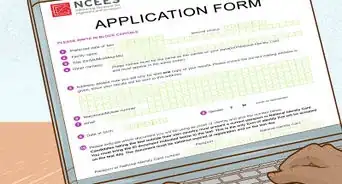This article was co-authored by Felipe Corredor and by wikiHow staff writer, Danielle Blinka, MA, MPA. Felipe is a Senior College Admissions Consultant at American College Counselors with over seven years of experience. He specializes in helping clients from all around the world gain admission into America's top universities through private, one-on-one consulting. He helps guide clients through the entire college admissions process and perfect every aspect of their college applications. Felipe earned a Bachelor's Degree from the University of Chicago and recently received his MBA.
There are 9 references cited in this article, which can be found at the bottom of the page.
This article has been viewed 72,358 times.
Engineers use science and mathematics to solve problems in most areas of society. Although you can become an engineer after receiving a bachelor's degree, many engineers opt to pursue graduate level studies, especially if they’re interested in doing research. If you’re interested in getting your doctorate in engineering, gather your prerequisites, choose your doctoral program, apply for admission, complete your coursework, and prepare your doctoral dissertation.
Steps
Gathering Your Prerequisites
-
1Complete your undergraduate degree. Before you can pursue graduate studies, you need to earn a bachelor’s degree. If you plan to get your doctorate in engineering, an undergraduate degree in engineering is your best option for gaining acceptance into a graduate program.
- Some doctoral programs will expect you to have earned a Master of Science before you’re admitted to the doctoral program, while others will allow you to earn your master’s while you work on your doctorate.
- You can still pursue a doctorate in engineering if you didn’t get an undergraduate degree in engineering, but the path is harder. You will need to take additional undergraduate classes in engineering, bring relevant work experience, and find a program that is willing to work with you.
-
2Participate in undergraduate research opportunities. Doctoral programs are focused on research, so start getting experience during your undergraduate career.[1] Start by volunteering for research being done by upperclassman and graduate students working on your campus. As you reach your junior- and senior-level coursework, talk to your professors about contributing to research projects.
- Apply for work-study, internship, and fieldwork opportunities.
- See if your school offers students the opportunity to get sponsorship for independent research projects, such as through a scholars award program.
- Be willing to take even the smallest role in a research project. Since you’re an undergraduate, you will likely need to do the grunt work to gain experience.
Advertisement -
3Network with faculty and research advisors. Build good relationships with your professors so that you can improve your research skills, gain opportunities for academic growth, and have a mentor in your field. Speak out in class, talk to them during office hours, volunteer to work on their research, and take multiple classes from your desired mentor.
- If your professors know you well, they’ll be able to write a better letter of reference about your skills, abilities, and work habits when you need them to apply for doctoral programs or jobs.
-
4Join clubs and organizations related to engineering. You can gain great networking opportunities and open doors for yourself by becoming part of organizations dedicated to engineering. You will not only meet other students in the same course of study, but you’ll also meet possible mentors. Some national organizations also have name recognition that can help you when you apply to doctoral programs or jobs.
- Your school will likely have local clubs in addition to national organizations, such as the American Society of Mechanical Engineers.[2]
- You should also look for honor societies. For example, you could join Tau Beta Pi, the engineering honors society.
- When your extracurriculars match up with the demands of your desired program, then you'll appear very enthusiastic about and prepared for the responsibilities you'd encounter.
-
5Maintain high grades. While a 3.0 is sometimes an acceptable grade point average for admittance into an engineering doctoral program, an average of 3.25 is more standard.[3] If you're interested in a big name school, you're likely going to need upwards of a 3.5 GPA to get into the program.
- Aim to make all A's with minimal B's if you want to pursue a doctorate in engineering.
- Consider doing grade replacement if you make lower than an A or B in a class, but check your college or university's limits on retaking courses.
-
6Take the Graduate Record Exam (GRE). As you complete your undergraduate work or after graduation, study for the GRE. You'll need to register for and take the GRE several months prior to applying for doctoral programs. When you apply for a graduate program, you’ll need recent scores. Scores remain active for five years.[4]
- Some programs may require you to take the GRE subject test, but not all do. Check the requirements for your university.[5]
Selecting a Doctoral Program
-
1Choose a path for study. To improve your chances of gaining admittance, narrow your focus to one field of engineering. While there are many facets to engineering careers, you can narrow your focus to one of the major degree paths, such as:
- Electrical engineering focuses on the study and application of electricity, electronics, and electromagnetism.
- Mechanical engineering focuses on designing, building, and operating machines.
- Aeronautical engineering focuses on the design and construction of aircraft and spacecraft.
- Computer engineering focuses on integrating electrical engineering concepts with computer science to develop computer hardware and software.
- Civil engineering focuses on designing, building, and maintaining structures, such as buildings, bridges, dams, and water supply systems.
- Environmental engineering focuses on finding solutions to environmental problems, such as pollution.[6]
-
2Research schools. Read about the programs available to you so that you can choose the best one for you. Look at schools near you, as well as the top programs in your chosen path of study. Don’t just focus on name recognition. Look for programs that can help you pay for your education and that are doing relevant research in your field of study.[7]
- Consider your research preferences and look for a school with a strong program in that topic.
- Make sure that the schools you apply to are conducting research in your chosen research interests.
- Check if the school will offer a fellowship, scholarship, teaching assistantship, or research position that will help you pay for your doctoral degree.
-
3Research the backgrounds of the professors at the schools. Since the emphasis of a doctoral degree is on research, you will be working with one or more of the professors at your school to collaborate on research projects. You will need to have a good working relationship with your professors, and your research will need to fit under the umbrella of the program's current research.
- Read each professor's background, curriculum vitae, and current research projects.
- When choosing your school, consider which professors you'd most like to work with based on what they are researching, their goals, and their background.
-
4Decide on a research path. Based on your own interests and the paths available to you, narrow your research path so that you can present it in your applications for graduate school. Universities choose doctoral candidates that fit into their research program, so you will need to show them what you plan to study.
-
5Select the schools you want to apply to. Choose the programs that fit your interests. Most students apply to between five and eight graduate programs.[8]
Applying for Admission
-
1Write a statement of purpose. Your statement of purpose will tell the university about you, your achievements, your path of study, and why you’ll be a good fit for their program. Focus on showing your best skills and why you’re a promising candidate for the program. Your program will set a word count, commonly about 300-500 words.[9]
- A statement of purpose may also be called an application essay, personal statement, objectives for study, personal goals, cover letter, or a related name.[10]
-
2Get letters of recommendation. Your program will likely ask for letters of recommendation. Ask your closest professors, engineering mentors, and research supervisors to write a recommendation for you.
- Make sure that you ask at least a month in advance so that the person has enough time to work on your letter.
- To aid the person in writing your letter, provide them with a short resume detailing your accomplishments.
-
3Assemble your application packets. Each program will have their own requirements, but most applications will require multiple parts. Check your program’s admissions guidelines for the requirements, which will likely include the following:
- Your completed application form.
- Your statement of purpose.
- GRE scores.
- Transcripts.
- Your curriculum vitae.
- 2-3 letters of recommendation.
- TOEFL or IELTS scores if you’re an international student.
-
4Send in your applications before the deadline. Make sure that you send in your items on time. Most doctoral programs have a narrow window for applications, and you may need to apply nearly a year in advance of beginning your studies.[11] If you don’t get your materials in on time, you won’t be considered for admission.
- Don’t wait until the last minute. Get your materials submitted in advance.
-
5Contact the professors you hope to work with. If you can show the faculty that you are familiar with their research and will be able to contribute, then it may help you gain admittance to the program. Since graduate programs are built around research, being familiar with current projects is important.
- Read up on the faculty’s biographies and curriculum vitae.
- Send them a formally written email.
- Say something like, “Your groundbreaking work on [research topic] is what interested me in [program name]. In my undergraduate research, I worked on [similar research topic].”
-
6Show the schools why you’ll be valuable to their research. Doctoral candidates usually help further the research goals of the university as research fellows. If you have relevant research skills or a background that contains work on similar projects, explain that history to your program.
- Offer a brief explanation of your research background or resume. Say, "During a senior year special project, I worked with ten other students alongside my professor to complete a project similar to the one you are currently developing."
- Explain, "As a lab assistant, I was able to shadow professors and doctoral candidates at my university, which allowed me to gain skills in how to conduct research and write reports."
-
7Accept enrollment and register for classes. Once you’re accepted, you will visit the campus and get advised by the faculty. Based on their recommendations and the requirements of the program, register for your classes.
- Get advised as early as possible to ensure that you are able to get into the classes you need.
Completing Your Coursework
-
1Perform well in your required classes. If you don’t maintain good attendance and high grades, then you can get kicked out of your program. Keep in good academic standing, and make sure that you complete all of the required coursework.
- You will need to pass your courses with at least a B.
- Expect to enroll in six to nine credit hours per semester because graduate courses are harder, making the requirements for a full load smaller.
-
2Choose a research supervisor. Work with your professors to find a supervisor. Look for someone whose research you can contribute to, and focus on how you can help them. Finding the right supervisor will require you to find someone with whom a relationship will be mutually beneficial.
- Enroll in the classes taught by your desired research supervisor. This will give you a chance to work with them and an opportunity for them to see your abilities and work habits.
- Look for faculty members who have current research projects that have openings for graduate assistantships.
- Don’t expect a posh position at first. Prove yourself by taking any research role available with your chosen mentor.
- You may also be able to assemble an advisory committee, depending on your university.
-
3Work with your advisor to develop a plan of study. Your plan of study will include your course objectives, a list of your required courses, a list of your intended electives, and early plans for your dissertation work. Your research supervisor and committee (if you have one) will need to approve this plan.
- You’ll submit your plan of study to the department chair after your research supervisor has approved it.
- It can be difficult to change your plan of study, so take the process seriously.
-
4Study the research in your field. A doctoral program is all about research, so you need to keep up with what’s going on in your field. Know the past findings, currently ongoing research, and avenues for further research. This will help you find a path for your own research.[12]
- Access papers and articles through the Institute for Research and Publication.
- Read engineering journals such as the Journal of Civil and Environmental Engineering, Journal of Applied Mechanical Engineering, Journal of Electrical Engineering and Electronic Technology, etc.
- Look for articles in scientific magazines that are related to your field.
- Check the university webpages for leading institutions such as MIT, Georgia Tech, Stanford, and University of California-Berkeley.
-
5Create your own research. As you complete your degree, you will start to perform original research. This is the ultimate goal of a Ph.D. candidate, so choose a topic that both interests you and provides areas for development.[13]
- There are many different types of engineering research, so you may be designing a new product or system, looking for ways to improve an existing system, or developing a new concept. What type of engineer you become will affect what type of research you do.
- Your research will still fit into the program’s major areas of study.
- You might also work on publishing a groundbreaking (or at least high quality and peer-reviewed) paper, as you can add this to your CV. You'll stand out as a candidate who takes initiative and accomplishes meaningful research in their field.
Preparing Your Doctoral Dissertation
-
1Select a dissertation topic. Your dissertation topic will come out of your independent research. With the help of your research supervisor, you will narrow your research focus so that you can complete a dissertation that will allow you to earn your degree.[14]
- A dissertation is a book length project.
- It is sometimes called a thesis.
-
2Fund your research. Apply for grants, look for sponsorship programs, or use crowdfunding to pay for your research. Depending on your university’s resources, you may be able to get more research leeway if you can attract additional funding. The quality of your research and dissertation will depend on available resources, such as funding.
- Check with your university for internal grants or awards.
- You can also look for grants through the United Engineering Foundation, Engineering Information Foundation, and similar resources.
- Ask businesses, organizations, and donors for sponsorships.
-
3Complete your research. In order to finish your dissertation and graduate, you’ll need to reach relevant conclusions through your independent research. The process will likely take years over the course of your doctoral work. During this time, you will work with other graduate students and your research supervisor. You will also enroll in classes dedicated to independent study rather than regular coursework.[15]
-
4Write your dissertation. Your dissertation will be a book length work, so plan to write it over a long period of time. It’s best to write it in pieces as you start and complete your research.[16]
- Consult with your research supervisor regularly.
- Visit your campus writing center if you need help with your writing.
- You can find software to help with formatting.
-
5Prepare for your oral defense. The best way to prepare for your defense is to know everything about your dissertation, including prior research, your methods, your research question, your process, the data, and the ultimate outcomes of your research project. Be prepared to answer any questions.[17]
-
6Present and defend your dissertation. Before your dissertation is complete, you will need to present it to your committee and defend it. Your committee will ask you questions and may suggest revisions. While the meeting should have a positive tone, expect to explain your processes, work, and outcomes.[18]
- The key to a defense is to show that you have the knowledge and research skills required to earn your doctorate.
Warnings
- Make sure that your research goals match with the university's research paths. The program you choose will control your research.⧼thumbs_response⧽
- Doctoral programs are competitive.⧼thumbs_response⧽
References
- ↑ https://www.cs.purdue.edu/homes/dec/essay.phd.html
- ↑ https://engineering.purdue.edu/Engr/Academics/StudentOrganizations
- ↑ https://engineering.purdue.edu/ECE/Academics/Graduates/Admissions/Criteria.html
- ↑ http://www.ets.org/gre/revised_general/faq/#faq601
- ↑ https://cheme.stanford.edu/admissions/phd/phd-faqs
- ↑ http://typesofengineeringdegrees.org/featured/#context/api/listings
- ↑ https://www.usnews.com/education/blogs/graduate-school-road-map/2012/11/12/grad-school-application-checklist-12-months-out
- ↑ https://www.usnews.com/education/blogs/graduate-school-road-map/2012/11/12/grad-school-application-checklist-12-months-out
- ↑ http://grad.berkeley.edu/admissions/apply/statement-purpose/
- ↑ https://uni.edu/~gotera/gradapp/stmtpurpose.htm
- ↑ https://www.usnews.com/education/blogs/graduate-school-road-map/2012/11/12/grad-school-application-checklist-12-months-out
- ↑ https://www.cs.purdue.edu/homes/dec/essay.phd.html
- ↑ https://www.cs.purdue.edu/homes/dec/essay.phd.html
- ↑ https://www.cs.purdue.edu/homes/dec/essay.phd.html
- ↑ https://www.cs.purdue.edu/homes/dec/essay.phd.html
- ↑ https://www.cs.purdue.edu/homes/dec/essay.phd.html
- ↑ https://www.cs.purdue.edu/homes/dec/essay.phd.html
- ↑ https://www.cs.purdue.edu/homes/dec/essay.phd.html
























































































